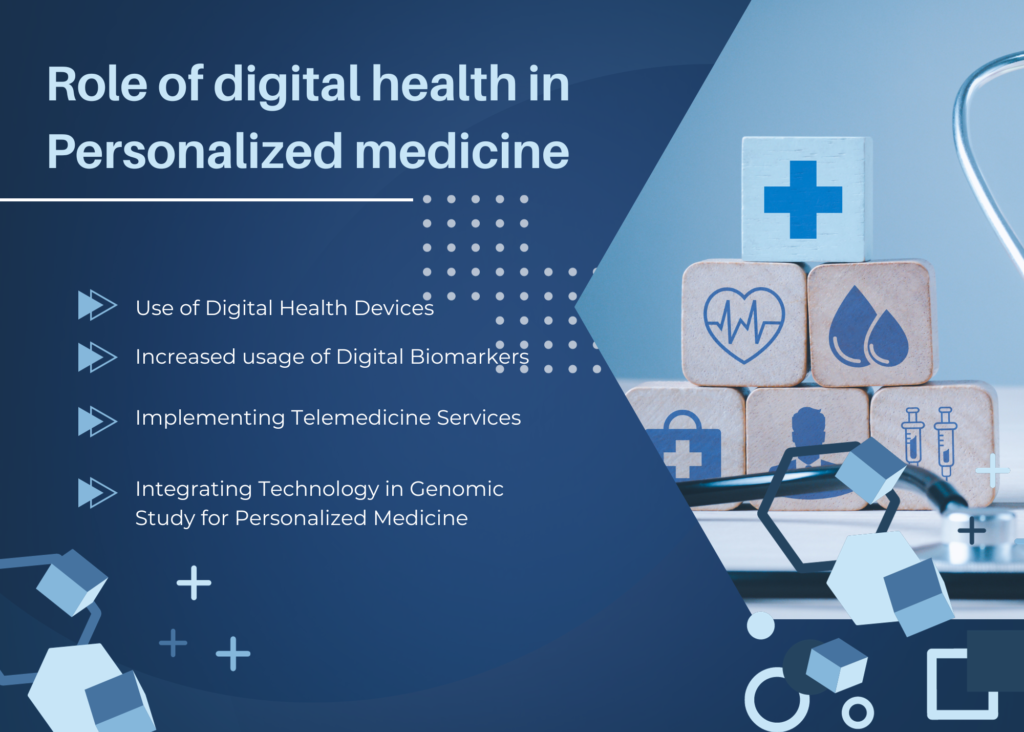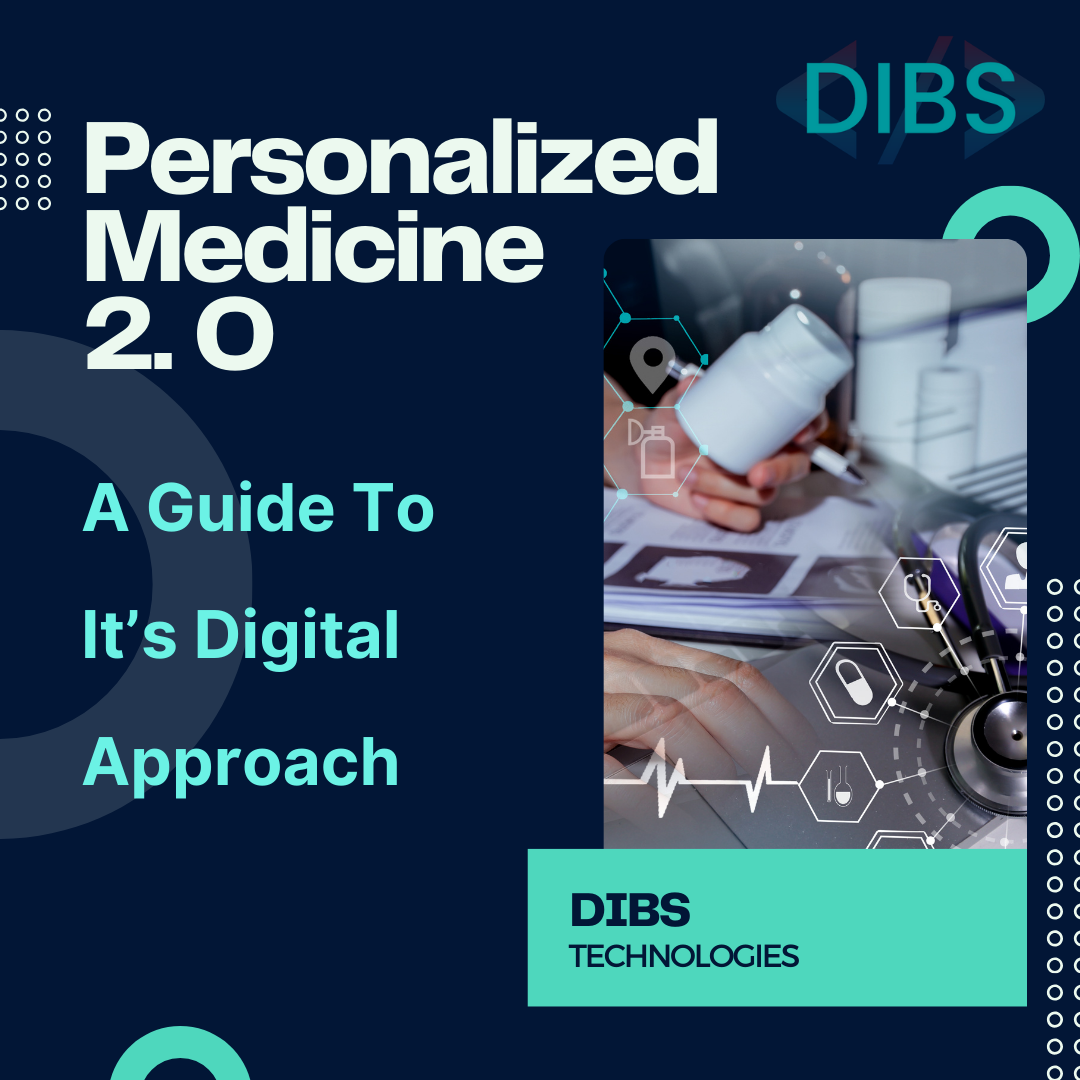The healthcare industry evolves rapidly, be it how patients receive therapy or integrating technology. One such evolution in the realm of the medical sector is the introduction of digital health in personalized medicine. With the integration of digital health in personalized medicine, medical professionals can draw insights into individual health, tailor therapy based on unique genetic profiles, and thus changing the approach to healthcare. Through this blog, we’ll explore the concept of personalized medicine, the role of digital health, the challenges, and the impact that the integration of the two can have on the future of healthcare.
Understanding Personalized Medicine
Personalized medicine, also known as precision medicine, is a newer approach to healthcare. Healthcare providers take into account individual differences in genes, environment, and lifestyles of the people. Traditional medicine designs treatment for an average patient and is a “one size fits all” approach. However, this approach is limited, as individuals vary significantly in their response to medications and treatments.
The adoption of personalized medicine aims to change this approach by leveraging advancements in genomics. Healthcare providers analyze an individual’s genetic makeup, biomarkers, and other molecular data and use them to tailor treatments for the patients. Thus, in turn, maximizing efficacy and minimizing side effects.
The Role of Digital Health in Personalized Medicine
Digital health uses a broad range of technologies, from wearables to artificial intelligence (AI), to improve medical care delivery. It also plays a crucial role in the advancement of personalized medicine. Here are some key aspects of how digital health is contributing to the personalized medicine sector:
Genomic Sequencing
The foundation of personalized medicine lies in genomics. Digital tools have made genome sequencing faster, making it more accessible and cost-effective. It allows healthcare providers to analyze an individual’s entire genome quickly, providing a better understanding of the patient’s genetic makeup.
Health Information Exchange
Digital platforms facilitate the seamless exchange of health information among healthcare providers. Data exchange is crucial in personalized medicine, where a patient’s health data, including genetic information, needs to be accessible to various specialists involved in their care.
Big Data and Analytics
The integration of big data analytics and machine learning in healthcare enables the processing of vast amounts of data generated by individuals. This allows for the identification of patterns, trends, and correlations that can inform personalized treatment plans. For example, AI algorithms analyze datasets to predict the response of a person to a specific medication based on their genetic profile.
Wearable Devices
Wearable devices, such as fitness trackers and smartwatches, provide real-time updates on an individual’s health. Integrating this data with genetic information provides a complete view of a person’s health. This continuous monitoring allows for early detection of potential health issues and the adjustment of treatment plans in real-time.

Challenges and Considerations
While the digitalization of personalized medicine is beneficial for effective healthcare delivery, there are various challenges. Here are some considerations that need to be addressed:
Data Privacy and Security
Handling sensitive genetic and health data requires robust privacy and security measures. Healthcare centers need to strike a balance on how to make data accessible for medical research and protect an individual’s privacy.
Interoperability
Ensuring that different digital health systems can communicate and share data seamlessly is crucial for the success of personalized medicine. The lack of interoperability among various platforms poses a significant challenge.
Ethical Concerns
As the capabilities of digital health and personalized medicine expand, ethical considerations become paramount. Issues such as consent for genetic testing, the responsible use of AI, and the potential for genetic discrimination need careful consideration.
Education
Being a newer approach in healthcare, precision medicine is less known to people. A healthcare professional should be trained to provide personalized medicinal intervention to their patients. Also, the general public needs to be educated about the benefits of personalized medicine.
Adoption
Digital health technologies require infrastructure development and training programs. It can be difficult for a healthcare provider to build the digital system on an individual level.
The Future of Healthcare
By digitalizing personalized medicine, we have transformed the healthcare landscape for good. Here, we can have a glimpse into the future of healthcare:
Targeted Therapies
Targeted therapies can be a better approach to deal with a disease and pharmaceutical companies can help in developing them. By understanding the individual genetic variations, professionals can address the specific cause of the disease, making treatment more effective. The shift from a one-size-fits-all model to targeted treatment can improve healthcare delivery to patients.
Preventive and Predictive Medicine
The integration of digital health data allows for the identification of risk factors and helps in predicting potential health issues before they manifest. Identifying the issue at the start can help to prevent them, and through personalized health plans, the burden of chronic diseases can be significantly reduced.
Patient Empowerment
Digital health tools empower individuals to actively participate in their healthcare. From monitoring their health metrics to making informed decisions about treatment options, patients become partners in their care.
Accelerated Research and Development
An acceleration in medical research has been witnessed since the integration of digital health in personalized medicine. The availability of large datasets, coupled with advanced analytics, makes it easier for researchers to develop a safe medical plan. Healthcare professionals can easily refine the therapies based on real-time data, making treatments more effective.
Conclusion
The digitalization of personalized medicine has made healthcare more effective, efficient, and patient-centric. As digital health technologies evolve, their integration with personalized medicine will likely become more seamless, providing healthcare professionals with unprecedented insights and patients with tailored, precision therapies. However, addressing the ethical, privacy, and interoperability challenges is crucial and should not be neglected. The future holds the promise of a healthcare system where treatments are as unique as the individuals they aim to heal, marking a new era in the history of medicine.
Talk to our experts and find out more about the latest healthcare developments and how DIBS team can help you to digitalize your personalized medicine facility by providing customized software to cater to all your needs ranging from data collection to data analysis and keep you well connected to your patients.







Leave a Comment